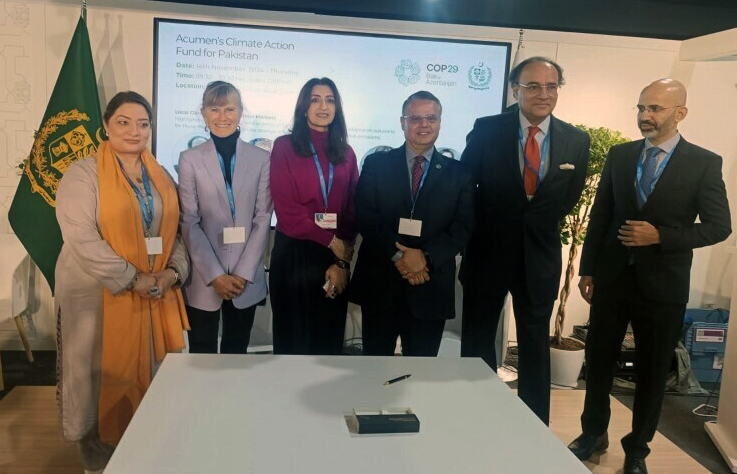At the prestigious COP29 global climate conference in Baku, Azerbaijan, Pakistan made headlines by unveiling its first-ever National Climate Finance Strategy (NCFS). This landmark announcement highlights Pakistan’s commitment to addressing the growing challenges of climate change at home and on the global stage. Let’s dive into what this strategy entails, why it’s crucial, and how it aligns with Mazboot Pakistan’s vision of empowering resilience and sustainable development.
A New Chapter in Pakistan’s Climate Journey
Pakistan is no stranger to the devastating impacts of climate change. Ranked among the top 10 most climate-vulnerable countries, the nation has experienced extreme weather events, including the catastrophic floods of 2022, which caused an estimated $30 billion in damages, affected over 33 million people, and claimed the lives of 1,700 individuals. In response, Pakistan’s government has taken a bold step forward with the launch of the National Climate Finance Strategy.
The strategy, jointly unveiled by Finance Minister Muhammad Aurangzeb and Prime Minister’s Coordinator on Climate Change Romina Khurshid Alam, aims to provide a comprehensive roadmap for accessing international and domestic finance to combat climate challenges. The event, held at the Pakistan Pavilion at COP29, was attended by key stakeholders, international climate experts, and development partners, reflecting the global significance of this initiative.
Key Objectives of the National Climate Finance Strategy
According to Aisha Humera Moriani, Secretary for the Ministry of Climate Change and Environmental Coordination, the NCFS is built on three foundational pillars:
- Enhancing Sectoral Resilience: Strengthening the capacity of critical sectors like agriculture, water resources, and infrastructure to withstand climate impacts.
- Clarifying Institutional Roles: Streamlining coordination among various government agencies and private stakeholders to ensure effective implementation.
- Bolstering Access to Diverse Financing: Leveraging multiple avenues to tap into international, domestic, and private financing options.
Finance Minister Aurangzeb emphasized that the NCFS is rooted in transparency, accountability, and inclusivity principles. He added that it is a “well-thought-out roadmap” to systematically access climate finance, focusing on climate-proofing policies and investments to support the most vulnerable communities.
Bridging the Climate Finance Gap
One of the most pressing issues highlighted during the unveiling was Pakistan’s significant climate finance gap, estimated at $348 billion by 2030. Romina Khurshid Alam noted that the NCFS is designed to address this gap by establishing a robust framework to attract funding, particularly from international donors and private investors.
The strategy also introduces a National Climate Finance Portal, which aims to ensure transparency in tracking climate finance inflows and outflows. This portal will hold stakeholders accountable and ensure funds are directed toward climate resilience initiatives.
Empowering Women and Marginalized Groups
In line with Mazboot Pakistan’s focus on women’s empowerment, the NCFS prioritizes inclusive policies that uplift marginalized groups. Alam highlighted the importance of integrating circular economy principles to drive resource efficiency and sustainable development, particularly benefiting women and vulnerable communities.
Pakistan’s Vision for a Climate-Resilient Future
Looking ahead, the NCFS aligns with Pakistan’s broader climate resilience vision for 2050, which includes:
- Resilient Infrastructure and Agriculture: Building adaptive infrastructure and promoting climate-smart agriculture to ensure food security.
- Climate-Smart Cities: Developing sustainable urban centers that can withstand extreme weather events.
- Diverse Livelihoods through Ecosystem Preservation: Supporting communities through sustainable livelihoods and ecosystem restoration projects.
Aisha Moriani highlighted ongoing initiatives like mangrove restoration and renewable energy projects, demonstrating Pakistan’s dedication to a sustainable future. The NCFS complements these efforts by setting ambitious emissions reduction targets—50% by 2030, with 15% from domestic efforts and an additional 35% contingent on international support.
Global Solidarity: A Call to Action
During the event, prominent figures like WWF-Pakistan President Adil Najam and Climate Vulnerable Forum Secretary General Mohamed Nasheed called on developed countries to fulfill their climate finance commitments. They stressed the need for accelerated funding to support vulnerable nations like Pakistan, which bear the brunt of climate change despite contributing the least to global emissions.
The World Bank’s Lead Climate Specialist for South Asia, Tom Kerr, commended Pakistan’s proactive approach and stated that the NCFS is a landmark achievement in leveraging available climate finance channels to meet national needs.
A Path Forward for Pakistan
The National Climate Finance Strategy unveiling is more than just a policy announcement—it’s a testament to Pakistan’s resilience and proactive approach to safeguarding its future. By focusing on sectoral resilience, inclusivity, and strategic financing, the NCFS sets the stage for a climate-resilient and sustainable Pakistan.
At Mazboot Pakistan, we celebrate this historic milestone as a reflection of our nation’s unwavering spirit to overcome challenges. We believe that highlighting these stories of resilience can inspire a new generation of leaders, entrepreneurs, and communities to take bold steps toward a sustainable future.

